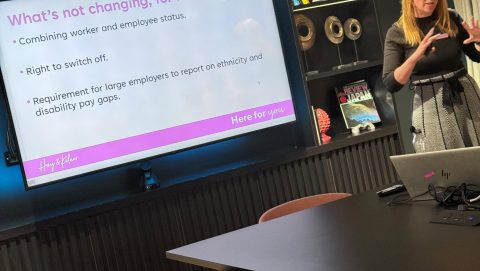
In the final step of the government’s ‘Living with Covid’ plan, from today (1 April) universal free Covid testing will end in England.
Although some free testing will continue through April in Scotland and Northern Ireland, testing will only be provided in England for the most vulnerable and those in certain frontline roles.
A temporary expansion to statutory sick pay has already been rolled back, and while those with symptoms will be advised to stay at home for the first five days, the government is keen for Covid to be treated “like other respiratory illnesses”.
These changes put the onus when it comes to handling Covid in the workplace squarely on employers, so we look into how HR professionals can best approach the changes.
How will the latest changes impact employees?
From tomorrow, free lateral flow tests will only be available for the most vulnerable people, as well as those working in care, frontline NHS services or in prisons. This means the majority of people will have to pay for a lateral flow test in England if they want to confirm the presence of a Covid infection and avoid mixing with people.
Jenny Harries, chief executive of the UK Health Security Agency, says the changes were being made to “[focus] our testing provision on those at higher risk of serious outcomes from the virus, while encouraging people to keep following simple steps to help keep themselves and others safe.”
Should employers ask workers to get tested if an infection is suspected?
Gemma Bullivant, HR coach and consultant, says employers need to develop their own strategy to this dilemma. She suggests a transitional approach over the next three to six months where employees are encouraged to test where Covid is suspected, with the business covering the cost. “Things need to be agile and open to change as circumstances change,” she says.
Bullivant adds securing a budget for a temporary measure such as this “might be easier than a wholesale and indefinite [approach] which may not be necessary in the long term”.
Joel Gujral, founder of MYNDUP, warns that firms are “inevitably going to see more people with Covid symptoms head into the office”, either because they can’t or don’t want to pay for testing. “Managers and HR teams are going to feel the strain when it comes to managing this,” he says, cautioning that this could lead to employee conflicts.
Should employers ask workers to stay at home if they have suspected Covid?
While there is no legal requirement for individuals to isolate if they suspect they have Covid, Rachel Suff, senior policy adviser for employment relations at the CIPD says that it is “advisable for employers to encourage employees with any potential Covid symptoms to get tested before coming into work”.
She also warns more generally that it’s “not good practice to encourage anyone who is ill to work, whatever the illness, and individuals should be advised to stay at home if they suspect they have contracted Covid-19”.
“The government has announced that new guidance will advise anyone with symptoms of Covid-19 or who feel unwell should continue to stay at home until they feel well enough to resume normal activities,” she adds.
However, David Jepps, employment partner at Keystone, says “low” rates of SSP create another risk that employees might attend work when they are ill to avoid missing out on pay. “Employers need to consider ongoing measures to preserve customer confidence for commercial reasons and specific risk assessments for employees that have particular vulnerabilities as general health and safety duties apply,” he says.
Are there risks to firms that take a ‘personal responsibility’ approach to staff attending work with symptoms?
The idea of ‘personal responsibility’ has been pushed heavily by the government in its ‘Living with Covid’ plans. But, Alan Price, CEO of Bright HR, warns that employers that don’t have in place “robust health and safety measures” to protect employees from Covid could still face tribunal claims if the virus is brought into the workplace – especially if there are vulnerable workers involved.
“A policy that Covid-positive employees can continue to come to work may place those with disabilities at a disadvantage,” he says, adding that employees could go as far as claiming indirect discrimination.
Gujral also emphasises that some cultural conflicts might also occur between employees as some are likely to feel more uncomfortable with others about colleagues potentially coming to work with Covid. For this reason he suggests managers and HR teams put in place clear processes and concrete guidance ahead of time.
“A good first step for HR teams and managers is to encourage an open communication culture that motivates employees to speak up about how they are feeling, this will help employees cope with the transition. Only then can they best manage new working Covid rules to avoid any upset or conflict,” Gujral said.
Source – https://www.peoplemanagement.co.uk/





















